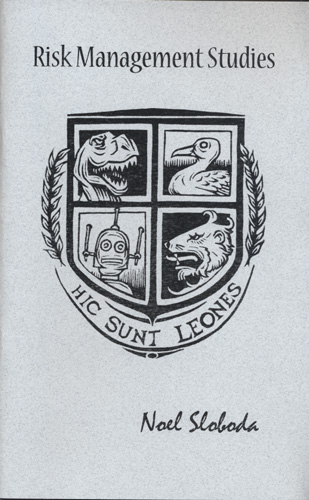Risk Management Studies
Risk Management Studies is a very reasonable riot. Noel Sloboda is playful through and through, and it is refreshing to read an entire chapbook that stays consistently hilarious. While the collection has a modernist slant, it never strays into critical territory. Risk Management Studies is a very reasonable riot. Noel Sloboda is playful through and through, and it is refreshing to read an entire chapbook that stays consistently hilarious. While the collection has a modernist slant, it never strays into critical territory.
The plot of the poems move the idea forward quite simply as Sloboda engages what it means to be a monster. The liberal age interacts with the course of nature in a manner that calls for a Researcher in the Humanities to make decisions. But the joke that is created is that the office of Risk Management is there to help the employees. Risk Management assesses ways for the company to continue making money. Cut the losses. Risk Management streamlines capitalism. Makes it faster. Like a shark, it only moves forward. In Risk Management Studies, Sloboda treats the office like they are counselors.
Each poem is endless in conceit. The fact that the book is only 20 pages indicates that he merely chose to stop there. The opening poem begins with dinosaur bones that are moving. “If other dinosaur skeletons have come to life, or do so in the near future, they might distract me from my work:” The joke here seems to be that the unanimated dinosaur bones are moving, but the real punchline comes at the end. The ongoings at the campus may distract him from his work. Each poem dabbles in the zany. There are deeper philosophical glimpses hanging around.
In the second poem Noel states:
Nobody can control every sign all the time. For instance, the headless crow I almost stepped on while smoking behind the cafeteria last Friday seemed to me a portent of evil—yet I do not blame your office for failing to prevent this encounter or expect you to save me from the future unpleasantness it augurs. The crow was just there.
So, while the poems exist as a joke against how brutal capitalism can behave (propping up entire systems that assess the risk and value of actual human lives), they also serve as a delivery system for Sloboda’s insights about humanity and his peculiarly specific interest that serves as the thread throughout the entire piece. The poem dated “January 14” discusses his inability to turn in blood samples and why he must turn it in on his own terms. Every poem or “letter” Noel cranks out seems to be more egocentric than the last, and they seem to devolve more and more. Or rather, pile on top of one another. Noel is asking that he doesn’t have to shed any more blood in the near future.
At the end of every letter, you can bet that Noel will make mention of the book he is writing about monstrosity, that he will make the allusion to Derrida in what seems like a way to prove his own worth:
This, in turn, might distract me from my work: a booklength study on monstrosity, which, Derrida posits, permits us to understand conventions by transgressing them. As such, your acceptance of the enclosed samples would be most appreciated.
That line, ‘understand conventions by transgression’ carries a weight throughout the entire book. The convention of writing a poem has certainly been transgressed through these pieces. These are prose pieces intended to mock a litany of issues. One of those issues is the convention of asking for help. Sloboda unloads more than meets the eye in every component of Risk Management Studies.
Near the end of the book, he is able to react to the reaction of the University Office of Risk Management. They write to him to discuss his influx of letters. What the reader must see is Sloboda himself carried away in his own monstrosity, both the becoming of a monster and the huge and complex building of a system that doesn’t work. In these last poems, it becomes apparent that we are also involved in a narrative. A long joke of course, but a story as well.
Dear University Office of Risk Management: You have probably heard by now that the university no longer employs me. In view of this unfortunate situation, I will require references while searching for a new academic appointment.
This is the final poem. All is lost and it kind of speaks about capitalism. The book is funny above all things, with a tendency to make the reader want to concoct his own letters. It’s a quick read and worth the few minutes it will take to sink into.





